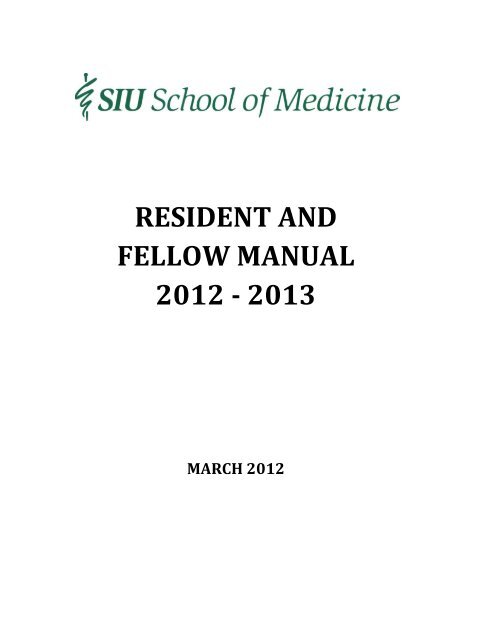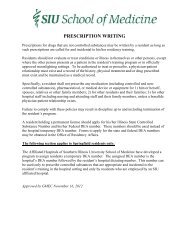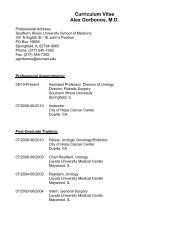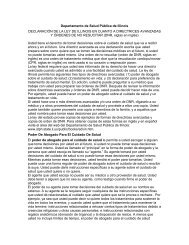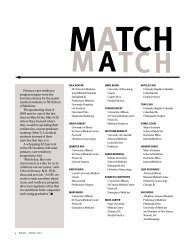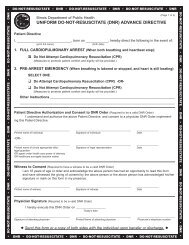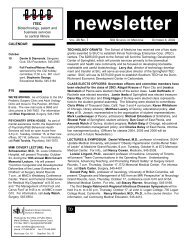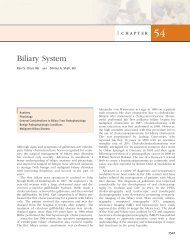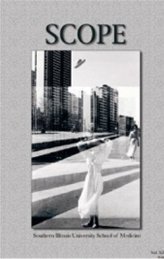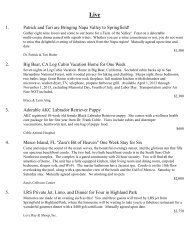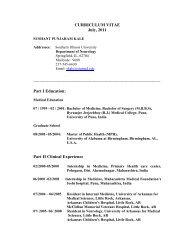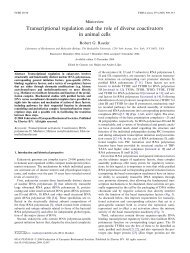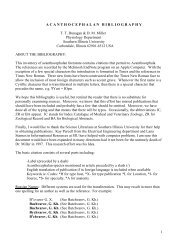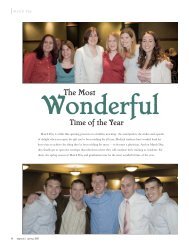Responsible Use Guidelines - SIU School of Medicine
Responsible Use Guidelines - SIU School of Medicine
Responsible Use Guidelines - SIU School of Medicine
You also want an ePaper? Increase the reach of your titles
YUMPU automatically turns print PDFs into web optimized ePapers that Google loves.
RESIDENT AND<br />
FELLOW MANUAL<br />
2012 - 2013<br />
MARCH 2012
Table <strong>of</strong> Contents<br />
Page<br />
Moving to Springfield, Illinois ........................................................................................................................... 5<br />
Housing ....................................................................................................................................................... 6<br />
Daycare........................................................................................................................................................ 6<br />
Illinois Residence .................................................................................................................................... 7<br />
Requirements Prior to Beginning Training ................................................................................................. 8<br />
Pre-Employment Screening ................................................................................................................ 9<br />
Drug and Alcohol Testing ..................................................................................................................... 9<br />
Licensure .................................................................................................................................................... 9<br />
USMLE/COMLEX Scores .................................................................................................................... 10<br />
Cardio Pulmonary Resuscitation .................................................................................................... 10<br />
National Provider Identifier Number ........................................................................................... 10<br />
Computer Based Online Training ................................................................................................... 10<br />
Hospital Specific Information ........................................................................................................................ 11<br />
Electronic Health Records ................................................................................................................... 12<br />
Exercise Rooms ..................................................................................................................................... 12<br />
Health Insurance .................................................................................................................................. 12<br />
Identification .......................................................................................................................................... 12<br />
Liability Insurance ............................................................................................................................... 12<br />
Medical Libraries .................................................................................................................................. 13<br />
On-Call Meals ......................................................................................................................................... 13<br />
Pagers ....................................................................................................................................................... 13<br />
Parking .................................................................................................................................................... 13<br />
PDAs and IPADSs ................................................................................................................................. 13<br />
Security .................................................................................................................................................... 14<br />
Shuttle Service ....................................................................................................................................... 14<br />
Sleeping Quarters ................................................................................................................................ 14<br />
Stipend Deposits ................................................................................................................................... 14<br />
General Information .......................................................................................................................................... 18<br />
Email ......................................................................................................................................................... 19<br />
English Skills Service .......................................................................................................................... 19<br />
Mail ............................................................................................................................................................ 19<br />
Page 3
Smoking ................................................................................................................................................... 19<br />
Student Loans ........................................................................................................................................ 19<br />
Telephones.............................................................................................................................................. 19<br />
Legible Handwriting ........................................................................................................................... 20<br />
Medical Records Abbreviations ...................................................................................................... 20<br />
Program Directory ............................................................................................................................... 21<br />
Resident Wellness and Fatigue ....................................................................................................... 22<br />
Napping Space ....................................................................................................................................... 22<br />
Policies and <strong>Guidelines</strong> ..................................................................................................................................... 23<br />
Institutional Policies ........................................................................................................................... 24<br />
Patient Information/Records .......................................................................................................... 25<br />
Release <strong>of</strong> Medical Information ...................................................................................................... 26<br />
Computer Usage <strong>Guidelines</strong> ............................................................................................................. 27<br />
Harassment Prevention and Reporting ....................................................................................... 28<br />
Dress <strong>Guidelines</strong> ................................................................................................................................... 29<br />
Disaster Plan Procedure .................................................................................................................... 30<br />
Legal Papers Being Served in Clinic Setting ............................................................................... 30<br />
Medicare Teaching Physician <strong>Guidelines</strong> and Procedures ................................................... 31<br />
Dictation <strong>Guidelines</strong> ............................................................................................................................ 39<br />
Maintenance and Disclosure <strong>of</strong> Information about Residents and Fellows .................. 42<br />
Bloodborne Pathogens and Needlestick ..................................................................................... 44<br />
Index ........................................................................................................................................................................ 45<br />
Page 4
MOVING TO<br />
SPRINGFIELD, ILLINOIS<br />
Page 5
SPRINGFIELD, ILLINOIS<br />
The City <strong>of</strong> Springfield is home to over 120,000 people spread across both the rural areas and inside the city.<br />
Serving as the capital <strong>of</strong> Illinois, Springfield <strong>of</strong>fers many activities for the entire family including a variety <strong>of</strong><br />
historic tourist attractions.<br />
To assist you with moving to Springfield, an “<strong>SIU</strong> Residents” Facebook group has been created. The “<strong>SIU</strong><br />
Residents” group will allow information to be posted and discussed on topics such as housing, child care,<br />
etc. Simply submit a request to join this group to access this information.<br />
Housing<br />
There are numerous apartment complexes, condominiums, houses and town-houses available for rent or for<br />
sale that will fit in anyone’s budget. Often, exiting residents and medical students will have a house or<br />
condo for sale at the same time new residents are looking for a home to purchase. If you would like<br />
information about exiting resident/student properties, please contact Jennifer Rodgers in the Office <strong>of</strong><br />
Residency Affairs at jrodgers@siumed.edu or call 217-545-8853. You can also access this information by<br />
joining the “<strong>SIU</strong> Residents” Facebook group.<br />
Listed below are some websites/resources that may help you in your upcoming move:<br />
Springfield Information<br />
http://springfield.il.us/<br />
www.visit-springfieldillinois.com<br />
http://www.capitalcityvisitor.com/<br />
Newspapers, Realtors and Apartments:<br />
State Journal Register – http://classified.sj-r.com/<br />
Illinois Times- www.illinoistimes.com/<br />
Springfield Area Realtors – www.seehouses.com/<br />
Resident to Resident Real Estate - www.r2rrealestate.com/<br />
Apartment Finder – www.apartmentfinder.com/Illinois/Springfield-apartments<br />
Utilities:<br />
Ameren CILCO 800-755-5000 www.ameren.com/<br />
CWLP (City Water Light & Power) 217-789-2030 www.cwlp.com/customer_service/customer_service.htm<br />
Comcast Cable 217-546-5045 www.comcast.com<br />
Daycare Services<br />
Currently Memorial Medical Center has a daycare facility that <strong>of</strong>fers child care services to employees and<br />
residents. Please contact Memorial Child Care facility at 217-788-3995 for information on fees and<br />
availability. There are several other facilities in Springfield and surrounding areas that <strong>of</strong>fer child care<br />
services, for more information contact:<br />
Home Daycare Providers Association- 217-788-1959<br />
Community Child Care Connection – 217-525-2805<br />
Page 6
ILLINOIS RESIDENCE<br />
Driving Information If you wish to establish residence in Illinois, you must purchase Illinois automobile<br />
license plates and obtain an Illinois driver’s license. Driver’s license tests/renewals and vehicle<br />
title/registration information and fees are available at<br />
http://www.cyberdriveillinois.com/departments/drivers/facilities/central/springfield.html<br />
KLEIN & MASON STREET FACILITY<br />
316 North Klein<br />
Springfield, IL 62702<br />
Phone: 217-782-4850<br />
HOURS:<br />
Monday: CLOSED<br />
Tuesday: 8:00 AM - 5:30 PM<br />
Wednesday: 8:00 AM - 5:00 PM<br />
Thursday: 8:00 AM - 5:00 PM<br />
Friday: 8:00 AM - 5:00 PM<br />
Saturday: 7:30 AM - 12:00 PM<br />
Sunday: CLOSED<br />
SPRINGFIELD DIRKSEN PARKWAY FACILITY<br />
2701 S Dirksen Parkway<br />
Springfield, IL 62723<br />
Phone: 217-782-600<br />
HOURS:<br />
Monday: 8:00 am - 5:00 pm<br />
Tuesday: 8:00 am - 5:00 pm<br />
Wednesday: 8:00 am - 5:00 pm<br />
Thursday: 8:00 am - 5:00 pm<br />
Friday: 8:00 am - 5:00 pm<br />
Saturday: CLOSED<br />
Sunday: CLOSED<br />
Voter Registration: You must be a resident in a precinct for 30 days before being eligible to vote.<br />
Registration can be done at several places throughout the city, including the above mentioned driver service<br />
facilities.<br />
Page 7
New Resident and Fellow<br />
Requirements Prior to<br />
Beginning Training<br />
Page 8
Prior to beginning training as a new resident or fellow at Southern Illinois University <strong>School</strong> <strong>of</strong> <strong>Medicine</strong><br />
there are several requirements that must be completed. Each <strong>of</strong> the items below are a condition <strong>of</strong><br />
employment and are stated in each contract. The items below MUST be completed before a resident/fellow<br />
can start:<br />
∗ Pre-Employment Screening by your employing hospital<br />
∗ Background check by your employing hospital<br />
∗ Your employing hospital’s required computer based learning (CBL) courses<br />
∗ Completed employment application/documents for your employing hospital<br />
∗ Valid visa and/or work authorization documents for your employing hospital<br />
∗ Valid Illinois Medical License<br />
∗ <strong>SIU</strong> <strong>School</strong> <strong>of</strong> <strong>Medicine</strong> required CBL courses<br />
∗ Signed contract<br />
∗ Passing USMLE/COMLEX scores (see USMLE/COMLEX on Page 10)<br />
∗ BLS/ACLS/ATLS/PALS/NRP certification<br />
Your employing hospital will send you information about employment screening, work authorization<br />
documents, background checks, employment forms, benefits information and their online training<br />
requirements.<br />
PRE-EMPLOYMENT SCREENING<br />
At the beginning <strong>of</strong> your appointment your employing hospital will require that a health questionnaire be<br />
completed. You must comply with the hospital’s policies concerning tuberculosis screening and<br />
immunizations, including measles, mumps, rubella, hepatitis B, and pro<strong>of</strong> <strong>of</strong> Chickenpox disease, positive<br />
titer or vaccination. This is required at the time <strong>of</strong> your initial pre-placement screening.<br />
DRUG AND ALCOHOL TESTING<br />
All incoming residents/fellows must pass a post-<strong>of</strong>fer drug and alcohol test as specified by the Affiliated<br />
Hospital's drug and alcohol testing program as a prerequisite <strong>of</strong> employment. The Physician shall not have<br />
the right to request for review his/her failure to successfully pass the post-<strong>of</strong>fer drug and alcohol test.<br />
LICENSURE<br />
All residents and fellows must hold either an Illinois Temporary Medical License or an Illinois Permanent<br />
Medical License. First year residents must apply for a temporary license. This process takes approximately<br />
8-12 weeks. Applications can be printed from the internet at www.idfpr.com/dpr/apply/physli.asp or can be<br />
requested from your program coordinator.<br />
Application for permanent licensure can be made after successfully passing Step III and completing 24<br />
months <strong>of</strong> clinical training, but is not required by <strong>SIU</strong> <strong>School</strong> <strong>of</strong> <strong>Medicine</strong> and its Affiliated hospitals.<br />
After securing a permanent license, a physician may apply for a state controlled substance number and<br />
federal DEA number.<br />
Page 9
USMLE/COMLEX SCORES<br />
All residents at <strong>SIU</strong> <strong>School</strong> <strong>of</strong> <strong>Medicine</strong> are required to pass Steps I and II (CK and CS/CE and PE) <strong>of</strong> the<br />
United States Medical Licensing Exam (USMLE) or Comprehensive Osteopathic Medical Licensing<br />
Examination-USA (COMLEX) before beginning a PGY1 or PGY2 position.<br />
Residents transferring from another program to a residency at PGY3 level or higher or any fellowship<br />
program at <strong>SIU</strong> <strong>School</strong> <strong>of</strong> <strong>Medicine</strong> are required to have passed USMLE or COMLEX Step III prior to<br />
beginning their training.<br />
Residents must pass Step III before progression to the PGY 3 year. Assistance in the application process<br />
is provided by the Office <strong>of</strong> Residency Affairs. To review this policy in its entirety, go to<br />
http://www.siumed.edu/resaffairs/ResidentInfo/policies.html.<br />
CARDIO PULMONARY RESUSCITATION<br />
Memorial Medical Center and St. John’s Hospital mandate that residents and fellows be certified in Basic<br />
Life Support (BLS) and ACLS (PALS for Pediatrics). This certification must be maintained throughout your<br />
residency regardless <strong>of</strong> specialty. Classes are provided by the affiliated hospitals. It is a pre-requisite to<br />
have a current BLS card to take the ACLS (PALS) course. It is the responsibility <strong>of</strong> the resident/fellow to<br />
pay for BLS training. The affiliated hospitals have agreed to pay for the ACLS (PALS) course. Your<br />
training program may also require that you be certified in Neonatal Resuscitation Program (NRP) or<br />
Advanced Trauma Life Support (ATLS). Contact your program coordinator for information about these<br />
required certifications.<br />
NATIONAL PROVIDER IDENTIFIER (NPI) NUMBER<br />
You will need to obtain an NPI number. There is no fee for this and it is done online by going to<br />
https://nppes.cms.hhs.gov/NPPES/Welcome.do. You will need to have a social security number, medical<br />
license, clinic information and taxonomy before you can complete this application. Your program<br />
coordinator will provide you with the directions, training contact information (clinic address, phone number,<br />
fax number) and taxonomy that are needed to complete this application.<br />
Why do you need an NPI number? Although residents/fellows do not practice as independent<br />
practitioners, with the advent <strong>of</strong> the EHR, NPI numbers are necessary to allow our hospitals and <strong>SIU</strong> to<br />
arrange the flow <strong>of</strong> lab results, etc., to residents/fellows for review before attendings.<br />
COMPUTER BASED ONLINE TRAINING (CBLs)<br />
Each incoming resident and fellow is required by their employing hospital, Residency Affairs at <strong>SIU</strong> <strong>School</strong><br />
<strong>of</strong> <strong>Medicine</strong>, and <strong>SIU</strong> HealthCare to complete online training modules. These modules must be<br />
successfully completed before you will be able to begin your training. Instructions on accessing these<br />
systems and completing these courses will be sent to each incoming resident/fellow.<br />
Your employing hospital will also require completion <strong>of</strong> online training courses. These are required to meet<br />
their Joint Commission on Accreditation <strong>of</strong> Healthcare Organizations (JCAHO) requirements. Your<br />
employing hospital will send you detailed instructions on these courses and how to access them. As you<br />
continue your training, you will be required to complete the hospital’s online courses on an annual basis.<br />
Page 10
HOSPITAL<br />
SPECIFIC<br />
INFORMATION<br />
Page 11
ELECTRONIC HEALTH RECORDS (EHR)<br />
<strong>SIU</strong> <strong>School</strong> <strong>of</strong> <strong>Medicine</strong>, Memorial Medical Center and St. John’s Hospital work together in a three way<br />
partnership to provide your residency education. However, because they are three distinct institutions, each<br />
partner has its own electronic health record. In the long term, being fluent in multiple EHR systems is<br />
actually an advantage, in the short term it means your learning curve will include learning three new systems.<br />
The systems and contact numbers for assistance are:<br />
• Memorial/Power Chart – Medical Informatics Office at 757-2288<br />
• St. John’s/Meditech – Physician Informatics Lab at 544-6464, ext 67455<br />
• <strong>SIU</strong> <strong>School</strong> <strong>of</strong> <strong>Medicine</strong> clinics/Centricity –EHR Help Desk at 545-4357<br />
Please be aware that labs, etc. , that you order in the hospital are imported directly to your desktop in<br />
Centricity, regardless <strong>of</strong> whether or not a resident has ambulatory care rotations. All residents, when exiting<br />
<strong>SIU</strong> will have to clear their desktop before they leave, so it is prudent to log into Centricity periodically to<br />
keep current on this. Even if you do not have outpatient clinics during your time here, it is wise to log into<br />
Centricity periodically.<br />
EXERCISE ROOMS<br />
Exercise rooms are available for residents and fellows at both hospitals. St. John's Hospital exercise room is<br />
located on the 12th floor. The Memorial Medical Center exercise room is located on the 8th floor. Contact<br />
your program coordinator or the Office <strong>of</strong> Residency Affairs for the access codes.<br />
HEALTH INSURANCE<br />
The Benefits Department <strong>of</strong> your employing hospital will explain your health insurance choices. Be<br />
prepared to answer health questions about yourself and your dependents. Please contact the Benefits<br />
Department <strong>of</strong> your employing hospital whenever you have questions concerning coverage.<br />
Memorial Medical Center Benefits Department<br />
Jennifer Davis Phone: 217-588-2984<br />
St. John’s Hospital Benefits Department<br />
Rose Knappmeyer Phone: 217-535-3979<br />
IDENTIFICATION<br />
For security reasons, photo identification badges will be issued by both St. John’s Hospital and Memorial<br />
Medical Center at the beginning <strong>of</strong> your training. All residents and fellows are required to wear a<br />
hospital/<strong>SIU</strong> photo identification badge when on duty in the hospital.<br />
LIABILITY INSURANCE<br />
Pro<strong>of</strong> <strong>of</strong> Liability Coverage for employees <strong>of</strong> St. John’s Hospital and Memorial Medical Center is provided<br />
on pages 15 - 17.<br />
Page 12
MEDICAL LIBRARIES<br />
The <strong>SIU</strong> Medical Library subscribes to a number <strong>of</strong> journals, most <strong>of</strong> which are available via the internet.<br />
Various electronics (computers, projectors, etc.) are available for loan, and a number <strong>of</strong> computer training<br />
courses are <strong>of</strong>fered regularly. Residents/fellows are encouraged to use the facilities at <strong>SIU</strong>, SJH, or MMC.<br />
The <strong>SIU</strong> library is located at 801 N. Rutledge, 4 th Floor.<br />
The SJH library is on the 2 nd floor <strong>of</strong> the hospital, just west <strong>of</strong> the administrative <strong>of</strong>fices.<br />
The MMC library is in the Medical Arts Building, 5 th Floor.<br />
ON-CALL MEALS<br />
Memorial Medical Center and St. John’s Hospital provide meals for residents when they are on call in the<br />
hospital.<br />
PAGERS<br />
Pagers are issued to all incoming residents/fellows during orientation. If your pager malfunctions at any<br />
time, please contact Pam Brown (217-788-3135) or a hospital operator.<br />
PARKING – MEMORIAL MEDICAL CENTER<br />
Residents are required to have a hang tag that will be issued by Memorial after they complete an application<br />
card. Residents should park in the physician ramp located on Rutledge Street on level 3 and above.<br />
Residents/fellows that park in unauthorized areas will have their vehicle ticketed.<br />
PARKING – ST. JOHN’S HOSPITAL<br />
Residents are required to have a hang tag that will be issued by St. John’s security. Residents should park on<br />
the east side <strong>of</strong> the first level <strong>of</strong> the 9 th Street Parking Ramp, which can be accessed from Carpenter Street or<br />
9 th Street.<br />
PDAs and IPADs<br />
PDAs are available for use during your training. There is no fee for using these, but if they are damaged or<br />
lost, there is a replacement fee. You will need to sign a contract that is renewable for each year you wish to<br />
keep the PDA.<br />
IPADS can be checked out for a 24 hour period to be used for rounding at St. John’s and must not leave<br />
hospital property.<br />
Please contact St. John’s Physician Informatics Lab at (217) 744-7455 or email physician@st-johns.org for<br />
additional information about PDAs or IPADS.<br />
Page 13
SECURITY<br />
Memorial Medical Center, St. John’s Hospital, and <strong>SIU</strong> have security personnel on duty 24 hours a day.<br />
They have general responsibility for the personal safety <strong>of</strong> patients and staff members and the protection <strong>of</strong><br />
property. Please contact the appropriate department at any time.<br />
<strong>SIU</strong> Security 217-545-7777<br />
SJH Security, emergency within the hospital - dial 111<br />
SJH Security, non-emergency 217-544-6464 ext 44020<br />
MMC Security, emergency 217-588-2000<br />
MMC Security, non-emergency 217-788-4900<br />
If you need an escort to a parking ramp or parking lot after hours or during hours <strong>of</strong> darkness, or if you have<br />
concerns for your personal safety in or around the medical areas, please call Security for assistance.<br />
You are advised not to store or leave personal valuables unattended. While theft is relatively rare, occasional<br />
losses do occur. If you are the victim <strong>of</strong> a theft, contact Security immediately.<br />
SHUTTLE SERVICE<br />
There is a shuttle service available for residents and fellows that travels between Memorial Medical Center<br />
and St. John's Hospital. The operating hours <strong>of</strong> the shuttle are Monday - Friday from 6:00 a.m. to 6:00 p.m.<br />
The shuttle pick up/drop <strong>of</strong>f at Memorial is located by the lower level <strong>of</strong> the physician parking garage near<br />
the LL "C" building. The shuttle pick up/drop <strong>of</strong>f at St. John’s Hospital is the main hospital entrance and the<br />
main entrance <strong>of</strong> the Carol Jo Vecchie Women’s & Children’s Center.<br />
The shuttle service is not available on weekends or after hours. Resident and fellows must provide their own<br />
transportation between hospitals during these times. Security personnel are only able to provide<br />
transportation in cases <strong>of</strong> emergencies. Emergencies in this situation are considered a patient related or<br />
medical emergency only.<br />
SLEEP ROOMS<br />
There are designated resident sleep rooms at Memorial Medical Center and St. John’s Hospital. Contact<br />
your program coordinator or the Office <strong>of</strong> Residency Affairs for a list <strong>of</strong> room locations and the access<br />
codes.<br />
STIPEND DEPOSITS<br />
Your stipend is deposited electronically at the bank <strong>of</strong> your choice. Both hospitals pay biweekly.<br />
Page 14
Page 15
Page 16
A new policy effective July 1, 2012 will be issued on June 20, 2012.<br />
Page 17
GENERAL<br />
INFORMATION<br />
Page 18
E-MAIL<br />
<strong>SIU</strong> <strong>School</strong> <strong>of</strong> <strong>Medicine</strong> issues an e-mail address to all incoming residents/fellows. All residents<br />
and fellows are required in their contract to check their siumed.edu e-mail account at least once a<br />
week. Important communication from the hospitals and Residency Affairs are sent regularly via email.<br />
Consult your program coordinator for instructions.<br />
ENGLISH SKILLS SERVICE<br />
If English is your second language, you may experience some difficulty making yourself<br />
understood by English-speaking listeners. Accent differences can create significant difficulties<br />
when you are communicating with patients and their families. You may also experience reduced<br />
effectiveness during formal presentations and clinical interactions with your medical colleagues.<br />
Lincoln Land Community College (located in Springfield) <strong>of</strong>fers a free “English as Second<br />
Language” class. For information about this class, contact Angela Gerberding via email at<br />
angela.gerberding@llcc.edu or your program coordinator.<br />
MAIL<br />
Your department will have a designated mail area for you to receive incoming mail.<br />
SMOKING<br />
Smoking is prohibited in and around all facilities used by <strong>SIU</strong> <strong>School</strong> <strong>of</strong> <strong>Medicine</strong> and its Affiliated<br />
Hospitals.<br />
STUDENT LOANS<br />
Deferments: On July 1, 2009, there were major changes to the eligibility requirements for the<br />
Economic Hardship Deferment (EHD) under which many residents previously qualified. As a<br />
result, most residents are no longer eligible, and while there are other Deferment categories<br />
available, they rarely apply to residents.<br />
Stafford Loans: The only option to delay payments for residents is through Forbearance. There<br />
are several different options <strong>of</strong> forbearance. One popular option is Mandatory Residency<br />
Forbearance. Under forbearance, no payments are required; however, interest continues to accrue<br />
and the federal government no longer pays interest on the subsidized portion <strong>of</strong> a borrower's loans.<br />
In addition, interest may be capitalized under forbearance, making this a more expensive option for<br />
borrowers.<br />
Perkins Loans: Perkins loans are usually granted by individual medical schools. Some schools<br />
will allow residents to apply for economic hardship deferment for up to 3 years during residency.<br />
You must contact the school that awarded the Perkins loans to apply.<br />
TELEPHONES<br />
The <strong>SIU</strong> telephone system was specifically developed for the telecommunication requirements <strong>of</strong> a<br />
large medical institution. It provides many unique features. Dictating to <strong>SIU</strong> Medical Records, St.<br />
John’s Hospital and Memorial Medical Center can be done by keying in the code that will be<br />
provided to you.<br />
Long distance calls relating to the care <strong>of</strong> patients may be dialed directly through the system (dial<br />
9-1-area code and number). Personal long distance calls must be charged to your residential<br />
telephone or personal credit card (dial 9-0-area code and number).<br />
Page 19
LEGIBLE HANDWRITING<br />
Legible handwriting is especially important in the practice <strong>of</strong> medicine where the findings <strong>of</strong> each<br />
physician seeing a given patient may have a significant bearing on the total medical picture. Please<br />
make a conscious effort to write legibly with black or dark blue ink in all pr<strong>of</strong>essional records and<br />
communications. Do not use a felt-tip pen as this may not create good carbon copies and ink may<br />
bleed onto the opposite page. Each entry should be made in the patient’s record at the appropriate<br />
place and include a clear signature and a date. In cases <strong>of</strong> some urgency, the time <strong>of</strong> note entry<br />
should be recorded as well.<br />
Page 20
PROGRAM PROGRAM DIRECTOR COORDINATOR PHONE FAX<br />
SPRINGFIELD CORE PROGRAMS<br />
Dermatology Lucinda Buescher, MD Stacy Miller 545-5465 545-4485<br />
Emergency <strong>Medicine</strong> Christopher McDowell, MD Linda Schneider 545-3518 545-2711<br />
Family <strong>Medicine</strong> Janet Albers, MD Debbie Lucas 757-8197 757-8155<br />
Internal <strong>Medicine</strong> Andrew Varney, MD Cathy Brower 545-5568 545-8156<br />
Med/Psych David Resch, MD Cathy Brower 545-5568 545-8156<br />
Neurology Rodger Elble, MD, PhD Stacey Dill 545-0168 545-8039<br />
OB/GYN Erica Nelson, MD Joan Evans 545-6498 545-7958<br />
Orthopaedics Keith Gabriel, MD Anita Weinhoeft 545-6155 545-7901<br />
Otolaryngology James Malone, MD Jenny Kesselring 545-4777 545-7512<br />
Pediatrics Michelle Miner, MD Ellen Marr 545-7827 545-2905<br />
Plastic Surgery Reuben Bueno, MD Jean Weitekamp 545-6112 545-2588<br />
Psychiatry Manisha Punwani, MD Vivian Smith 545-7627 545-2275<br />
Radiology John Becker, MD Stacie Skelton 757-2387 788-5582<br />
Surgery John Mellinger, MD Bernie Lornitis 545-4401 545-2529<br />
Urology Tobias Köhler, MD Robin Zorn 545-3262 545-7305<br />
Vascular Surgery Douglas Hood, MD Rhonda Loyd 545-8856 545-2563<br />
SPRINGFIELD FELLOWSHIPS<br />
Adult Reconstructive Surgery Khaled Saleh, MD Anita Weinhoeft 545-6155 545-7901<br />
Child Psychiatry Ayame Takahashi, MD Ruth Stark 545-7644 585-6890<br />
Colon & Rectal Surgery Jan Rakinic, MD Jolene Williams 545-7230 545-7762<br />
Endocrinology Carmel Fratianni, MD Carole Gibson 545-0166 545-9125<br />
Hand/Micro Michael Neumeister, MD Cheryl Matthews 545-7018 545-2588<br />
Head & Neck Thomas Robbins, MD Jenny Kesselring 545-4777 545-0253<br />
Infectious Diseases Janak Koirala,, MD Nancy Mutzbauer 545-9148 545-8025<br />
Minimally Invasive Gyn Surg Sohail Siddique, MD Joan Evans 545-6498 545-7958<br />
Pulmonary <strong>Medicine</strong> Joseph Henkle, MD Jacie Burt 545-0187 788-5543<br />
Spine Surgery Per Freitag, MD Anita Weinhoeft 545-6155 545-7901<br />
Vascular Surgery Douglas Hood, MD Rhonda Loyd 545-8856 545-2563<br />
AFFILIATE CORE PROGRAMS AND FELLOWSHIPS<br />
Carbondale Family <strong>Medicine</strong> Quincy Scott, DO Chris Null 618-536-6621 ext 221 618-453-1102<br />
Carbondale Hospitalist Quincy Scott, DO Chris Null 618-536-6621 ext 221 618-453-1102<br />
Carbondale Sports <strong>Medicine</strong> Scott Schonewolf, DO Chris Null 618-536-6621 ext 221 618-453-1102<br />
Decatur Family <strong>Medicine</strong> John Bradley, MD Tina Hartwig 872-0850 872-0851<br />
Decatur Hospitalist Jessie Junker, MD Tina Hartwig 872-0850 872-0851<br />
Quincy Family <strong>Medicine</strong> Tom Miller, MD Mary Ann Epley 224-8957 224-7950<br />
Quincy Sports <strong>Medicine</strong> James Daniels, MD Linda Savage 277-5772 224-7950<br />
All phone and fax numbers are area code “217” unless indicated otherwise.<br />
Page 21
RESIDENT WELLNESS<br />
Residency training is a time <strong>of</strong> tremendous personal and pr<strong>of</strong>essional growth. It can also be very<br />
stressful. It is not at all uncommon for residents from time to time to feel stressed, overwhelmed,<br />
burned-out, or even to develop clinical depression. If you should experience any <strong>of</strong> these, we<br />
encourage you to seek or accept help. You do not need to shoulder these burdens alone. If you are<br />
feeling overwhelmed, find someone you trust to talk to, whether it be a colleague, friend or family<br />
member, your doctor, a religious advisor, or your program director. For any resident who needs<br />
some pr<strong>of</strong>essional assistance, multiple resources are available. A list <strong>of</strong> resources can be viewed at<br />
http://www.siumed.edu/resaffairs/ResidentInfo/wellness.html.<br />
FATIGUE<br />
Acute and chronic sleep loss can substantially impair physical, cognitive, and emotional<br />
functioning in human beings. Overworked residents report sleepiness tendencies that are<br />
equivalent to those found in some clinical populations <strong>of</strong> patients with sleep apnea or narcolepsy.<br />
After one night <strong>of</strong> missed sleep, cognitive performance may decrease by as much as 25%. Sleep<br />
debt tends to accumulate until enough catch up sleep is obtained.<br />
Chronic sleep loss results in lower cognitive and fine motor performance, and has negative effects<br />
on mood, motivation, life satisfaction and on pr<strong>of</strong>essional and personal relationships. Fatigued<br />
drivers are at higher risk for accidents and near accidents.<br />
It is the policy <strong>of</strong> <strong>SIU</strong> that all duty hours must be consistent with ACGME requirements. Programs<br />
are responsible for monitoring resident activities to ensure that resident fatigue does not contribute<br />
to diminished learning or detract from patient safety. Residents can help by ensuring that they get<br />
enough sleep during their <strong>of</strong>f hours and by monitoring themselves for the following signs <strong>of</strong><br />
fatigue:<br />
1. Sluggish thinking or inability to concentrate.<br />
2. Inability to stay awake in the absence <strong>of</strong> external stimulation.<br />
3. Irritability.<br />
4. Tremors.<br />
A resident experiencing any <strong>of</strong> these symptoms must immediately get some rest. The most<br />
effective strategy to counter fatigue is sleep. Even a short nap can temporarily reverse the impact<br />
<strong>of</strong> sleep loss. Any resident who is experiencing these symptoms or feeling overly fatigued at the<br />
end <strong>of</strong> his or her work day should take a short nap before driving home or catch a ride with a coworker<br />
or taxi. If you take a taxi home, submit your receipt to the Office <strong>of</strong> Residency Affairs<br />
and they will reimburse you.<br />
NAPPING SPACE/SLEEP ROOMS<br />
Sleep rooms have been identified at both hospitals to accommodate napping. Contact your<br />
program coordinator or the Office <strong>of</strong> Residency Affairs for the location and entry code to these<br />
rooms.<br />
Page 22
Policies<br />
and<br />
<strong>Guidelines</strong><br />
Page 23
The following institutional policies are available on our website at<br />
http://www.siumed.edu/resaffairs/ResidentInfo/policies.html. Your training program<br />
will also have program-specific policies that they will provide to you.<br />
� Academic Deficiency Policy<br />
� Closure/Reduction Policy<br />
� Drug Screening for Employment<br />
� Due Process and Resident Complaint Policy<br />
� Duty Hours Policy<br />
� Harassment Policy<br />
� Impairment Policy<br />
� Industry Relations Policy<br />
� International Elective Policy<br />
� Licensing Exam Policy<br />
� Medical Records Completion Policy<br />
� Moonlighting Policy<br />
� Off-Site Rotation <strong>Guidelines</strong><br />
� Prescription Writing Policy<br />
� Pr<strong>of</strong>essional Conduct and Misconduct Policy<br />
� Residents Who Start Late<br />
� Selection, Evaluation and Supervision <strong>of</strong> Residents<br />
� Social Media <strong>Guidelines</strong><br />
� Supervision Policy<br />
� Time Record Completion<br />
� USMLE/COMLEX Policy<br />
� Vacation and Other Leaves <strong>of</strong> Absence Policy<br />
On the following pages are some additional policies and guidelines that will be<br />
useful to know and refer to during your training.<br />
Page 24
PATIENT INFORMATION/RECORDS<br />
Many medical workers have access to medical records, x-rays, laboratory reports, and other sources<br />
<strong>of</strong> information concerning patients. All such information is considered confidential and must not<br />
be revealed under any circumstances. Only physicians and others specifically authorized to do so<br />
may divulge laboratory, medical and surgical findings, and then only to the proper persons. Under<br />
federal and state privacy laws unauthorized release <strong>of</strong> confidential information about patients is not<br />
only ethically wrong but could also involve both the individual and <strong>SIU</strong> in legal action. At no time<br />
should individuals call for their own medical record or the records <strong>of</strong> friends, relatives, or others<br />
without legitimate reason. Unauthorized release <strong>of</strong> confidential information concerning patients<br />
may be cause for immediate dismissal.<br />
The medical record is the most complete and permanent repository <strong>of</strong> all data gathered during<br />
examination, diagnosis and treatment by health care providers. It is among the most important<br />
assets and is also a very important resource for the care <strong>of</strong> patients. The ready availability <strong>of</strong> the<br />
patient’s medical record facilitates his/her care, serves the convenience <strong>of</strong> the physician and may be<br />
<strong>of</strong> lifesaving importance on occasion.<br />
Because a sizeable group <strong>of</strong> personnel are legitimately concerned with the use <strong>of</strong> medical records<br />
in many areas, certain policies have been established so that medical records are properly preserved<br />
and safeguarded and their whereabouts are known at all times. As a resident or fellow at <strong>SIU</strong>, you<br />
are expected to know these policies and follow the procedures for safeguarding the integrity <strong>of</strong><br />
medical records. The general guidelines are as follows:<br />
• The Medical Records Access Policy applies to all medical information, whether in written, oral,<br />
reproduced or electronic form.<br />
• No part <strong>of</strong> a patient’s medical record or reproductions there<strong>of</strong> may be released to anyone<br />
outside <strong>of</strong> the institution other than the patient without written authorization from the patient.<br />
(For exceptions, see “RELEASE OF MEDICAL INFORMATION”.)<br />
• Medical records shall be requested only for <strong>SIU</strong> business or routine duties.<br />
• Personal medical records or those <strong>of</strong> family members cannot be requisitioned.<br />
• The medical record must stay on site and be traceable in the record-keeping system.<br />
• The medical record and the patient will not be separated in the hospital.<br />
• Handle sensitive tests and results appropriately according to institutional procedures, but do not<br />
be overly restrictive or draw attention to the tests or reports.<br />
• Patient information obtained from electronic systems must be treated with the same degree <strong>of</strong><br />
confidentiality as the paper medical record. You are responsible for information accessed using<br />
your password. Temporary printed reports must be discarded appropriately. Patient<br />
information must not be left on screens where it would be visible to others. Please log<strong>of</strong>f all<br />
systems when you are done.<br />
Page 25
RELEASE OF MEDICAL INFORMATION<br />
HIPAA, ILLINOIS LAW AND <strong>SIU</strong> POLICY<br />
Information given by a patient to a physician or acquired by a physician through examination and<br />
treatment <strong>of</strong> a patient is confidential. By law, medical information should not be communicated to<br />
anyone unless the patient has given written consent or unless the situation falls within one <strong>of</strong> the<br />
exceptions to the law. This applies regardless <strong>of</strong> the seemingly innocent nature <strong>of</strong> the request or<br />
the character <strong>of</strong> the inquirer (e.g., health care provider, attorney, insurance representative,<br />
investigator, relative).<br />
LEGAL EXCEPTIONS<br />
• Release <strong>of</strong> medical information may be made without a patient’s written consent in a medical<br />
emergency when you are unable to obtain the patient’s consent due to the patient’s condition or<br />
the nature <strong>of</strong> the medical emergency.<br />
• Medical information may be exchanged with any healthcare provider without written patient<br />
authorization when necessary for current treatment, unless the patient has requested that<br />
medical information not be sent to that provider. Additionally, specific written authorization<br />
would still be required in accord with Federal law if the information to be released contains<br />
drug and/or alcohol treatment information.<br />
• Statutes or appropriate regulations may require that you give information to specified public<br />
authorities. Examples are the reporting <strong>of</strong> gunshot wounds, suspected maltreatment <strong>of</strong> minors,<br />
animal bites, certain communicable diseases, and the information required for a certificate <strong>of</strong><br />
death. If you are in doubt in these cases, do not assume that the information may be given.<br />
Instead, seek the advice <strong>of</strong> a member <strong>of</strong> the Legal Department.<br />
Preserve patient privacy. Don’t<br />
talk about patients in elevators or<br />
hallways. Family or friends may<br />
overhear your conversation.<br />
Page 26
GENERAL RULES FOR THE USE OF UNIVERSITY OWNED COMPUTERS & NETWORKS:<br />
<strong>Use</strong>rs <strong>of</strong> University-owned computers and systems must comply with all Federal and State laws, as well as<br />
all University and Departmental rules and regulations.<br />
Always protect your usernames and passwords. DO NOT permit anyone to use your login to access any<br />
system. You are 100% responsible for any activity that takes place by anyone logging in as you. Be aware<br />
that sharing your username and password for any University or Hospital system constitutes at a minimum a<br />
serious HIPAA violation and could result in disciplinary action. Make sure that you log out <strong>of</strong> all systems<br />
when you are finished using them.<br />
Installing and/or running non-work or study related s<strong>of</strong>tware, such as music sharing/downloading<br />
s<strong>of</strong>tware, games, and other personal systems, on any University-owned computer system is strictly<br />
prohibited.<br />
<strong>Use</strong>rs are reminded that university-owned computers and networks (including dial-in access) are<br />
restricted to work- and study-related use. In particular, University-owned equipment and networks<br />
should never be used for:<br />
� personal arts and entertainment (e.g., Internet games, movies, iTunes, etc.)<br />
� streaming audio and/or video, with the exception <strong>of</strong> work related uses. Prohibited streaming<br />
includes news broadcasts, internet radio or television, background music, etc.<br />
� non-<strong>SIU</strong> related downloading <strong>of</strong> large files, particularly multimedia (movies, music)<br />
� Peer to peer networking (P2P) and file sharing applications, such as iMesh, Morpheus, Warex P2P,<br />
WinMX and Limewire<br />
When such use is detected, it will be vigorously pursued and stopped. As an institution, we cannot afford<br />
to pay for additional bandwidth to accommodate illegitimate use, nor can we afford to have legitimate<br />
University work impeded by such use.<br />
The <strong>SIU</strong> Board <strong>of</strong> Trustees policy on use <strong>of</strong> electronic information systems states:<br />
“Southern Illinois University takes justifiable pride in the electronic information systems<br />
provided to its faculty, staff, and students. These resources include computer systems,<br />
university-owned computers and workstations, s<strong>of</strong>tware, data sets, and communication<br />
networks. Members <strong>of</strong> the university community may use these resources only for purposes<br />
related to their studies, instruction, the discharge <strong>of</strong> duties as employees, <strong>of</strong>ficial business<br />
with the university, or other university-sanctioned activities. Any other use, unless<br />
specifically authorized, is prohibited.”<br />
“Examples <strong>of</strong> inappropriate and unacceptable use <strong>of</strong> computing and networking resources<br />
include….<br />
f) use <strong>of</strong> computer and/or network facilities in ways that impede the computing activities <strong>of</strong> others;<br />
g) use <strong>of</strong> computing facilities for personal or business purposes unrelated to the mission <strong>of</strong> the<br />
university;<br />
h) violation <strong>of</strong> copyrights and s<strong>of</strong>tware license agreements;….”<br />
<strong>SIU</strong> Board <strong>of</strong> Trustees 5 Policies J<br />
Please review <strong>SIU</strong> <strong>School</strong> <strong>of</strong> <strong>Medicine</strong>’s full<br />
<strong>Responsible</strong> <strong>Use</strong> <strong>Guidelines</strong> at<br />
http://www.siumed.edu/ir/policy/Acceptable_<strong>Use</strong>.pdf<br />
Page 27
Page 28
<strong>SIU</strong> HEALTHCARE EMPLOYEE DRESS GUIDELINES<br />
PURPOSE<br />
To ensure that employees know and understand the importance <strong>of</strong> appropriate dress in the workplace.<br />
GUIDELINE<br />
Employees should be suitably groomed and appropriately dressed so as to portray a pr<strong>of</strong>essional image for <strong>SIU</strong><br />
HealthCare. Standards <strong>of</strong> dress in the clinical community should parallel those in the business/pr<strong>of</strong>essional<br />
employment setting. Good judgment should be exercised to ensure appropriate length and fit for a pr<strong>of</strong>essional<br />
setting. Dress shirts and blouses must cover midriff and not display cleavage. Shoes must be worn at all times.<br />
You may wear slacks, dress pants whose length is mid-calf or lower, skirts, and dresses without hose or socks.<br />
Sleeveless blouses and shirts <strong>of</strong> a pr<strong>of</strong>essional nature and good taste are acceptable in non-clinical areas. All faculty<br />
and staff should wear lab coats and/or shirts with sleeves when in a clinical area. Staff who are provided <strong>SIU</strong><br />
HealthCare smocks must wear these at all times while in a clinical area. Scrubs should not be worn by front desk<br />
staff. Dress standards may affect the health, safety, or actual work performance <strong>of</strong> employees, co-workers or<br />
department clientele. Protective clothing or other appropriate dress may be required in some work areas for the<br />
protection and safety <strong>of</strong> employees. All clothing and footwear must be clean and in good repair. Close-toed shoes<br />
must be worn at all times in areas where blood or body fluid spills are possible as well as potential<br />
exposure to sharps (OSHA mandate). This includes all laboratory and patient care areas and applies to all<br />
faculty, staff, and students who walk into these areas (including reception and clerical). “Clog-type” shoes are<br />
acceptable as long as the toe is closed. Employees are expected to maintain high standards <strong>of</strong> personal hygiene<br />
and cleanliness. <strong>Use</strong> <strong>of</strong> personal care products (i.e. perfumes, colognes, aftershave, hair care products) should be<br />
minimal. Employees may be asked to discontinue the use <strong>of</strong> personal care products which are <strong>of</strong>fensive to others<br />
should complaints be made.<br />
Appropriate pr<strong>of</strong>essional dress includes:<br />
Slacks Skirts<br />
Suits Dresses<br />
Collared shirts Nursing uniforms<br />
Jackets or sports coats Dress pants whose length is mid-calf or lower<br />
Denim skirts, jackets, dresses, or jumpers - if free <strong>of</strong> holes and not excessively faded.<br />
Tennis shoes may be worn as long as they are a solid color, clean and in good condition<br />
The following items are unacceptable dress for any work area:<br />
Sweatpants Sweatshirts<br />
Miniskirts Halter and tube tops<br />
T-shirts Shorts<br />
Leggings or leotards See through clothing<br />
Jeans (denim or colored) Low cut or midriff blouses or dresses<br />
Skorts and dress shorts<br />
Tank tops, spaghetti strapped tops/dresses unless worn under a jacket or sweater<br />
Jeans may only be worn by staff whose work requires casual dress, approved by their supervisor, and who are<br />
NOT in a clinical work area and/or other direct patient care area and/or have public contact. Sweatshirts and Tshirts<br />
may be allowed with supervisory approval.<br />
Nursing staff who wear street clothes should follow the same dress guidelines and wear a lab coat and name badge<br />
if duties require them to be in the clinical area.<br />
Should employees choose to arrive for work dressed inappropriately according to the guidelines established above,<br />
they may be sent home to change clothes. Repeated infractions shall result in disciplinary action.<br />
Approved by Practice Leadership Team: 9/8/11<br />
Page 29
DISASTER PLAN PROCEDURE<br />
In the event <strong>of</strong> a critical incident, emergency or disaster, residents will be an integral part <strong>of</strong> the response.<br />
If a disaster situation is declared by either or both hospitals, residents on Trauma service will report to the<br />
trauma team. Other residents will report to whichever hospital is most accessible to them, unless<br />
otherwise directed. Those at St. John’s hospital will meet in the designated manpower pool located in the<br />
Physician’s Lounge. Those at Memorial Medical Center will meet at a place determined by the<br />
Designated Incident Commander.<br />
Notification and assignment <strong>of</strong> residents to their respective manpower pools will be coordinated through<br />
the Office <strong>of</strong> Residency Affairs after consulting with the hospital(s).<br />
The Office <strong>of</strong> Residency Affairs will contact the program director or coordinator <strong>of</strong> each program.<br />
Individual departments will then be responsible for notifying residents <strong>of</strong> the disaster and their hospital<br />
assignment. Once they have reached the Designated Manpower Center <strong>of</strong> their assigned hospital,<br />
residents will follow the disaster plan <strong>of</strong> that particular hospital.<br />
Revised and Adopted by GMEC on November 17, 2006<br />
GUIDELINES FOR WHEN LEGAL PAPERS ARE SERVED IN THE CLINIC SETTING<br />
1. If it is a medical liability situation, the server should be directed to the Risk Management Office<br />
<strong>of</strong> the appropriate hospital.<br />
2. For legal papers other than a medical liability situation, the program coordinator should be<br />
contacted to reach the resident and to facilitate the meeting between the server and the resident,<br />
but should not be physically present unless requested by the resident.<br />
3. The resident should immediately notify the <strong>SIU</strong> Office <strong>of</strong> General Counsel that he/she has been<br />
served in a medical liability claim and should be prepared to provide the name <strong>of</strong> the case.<br />
4. No staff person should accept legal papers on behalf <strong>of</strong> any resident.<br />
Amended and Approved by GMEC April 20, 2007<br />
Page 30
Page 31
Page 32
Page 33
Page 34
Page 35
Page 36
Page 37
Page 38
Dictation <strong>Guidelines</strong><br />
This guide serves as a resource to help you learn how to properly utilize a dictation system. The<br />
following steps can be followed for either St. John’s Hospital or Memorial Medical Center.<br />
Although the use <strong>of</strong> a hospital dictation system seems rudimentary, there are several things you can do<br />
to ensure your dictation is typed accurately.<br />
Inputting the Medical Record Number<br />
Accurately inputting the medical record number is very important. Simply inputting all 9s or some other<br />
number because you don’t know what the medical record number is causes confusion for transcription<br />
staff. Correctly inputting the medical record number ensures that the dictation is matched up with the<br />
correct patient. It also allows transcription staff to look up a dictation very quickly if you need it typed<br />
STAT. Without the correct medical record number, the staff has no way to find your dictation other<br />
than to physically listen to everything you’ve dictated.<br />
St. John’s Hospital<br />
The medical record number is an 8 digit number that begins with the letters MA. It is completely<br />
separate from the 12 digit account number that begins with the letter Y. Please make sure you are<br />
entering the 8 numbers <strong>of</strong> the medical record number on the key pad and not the 12 digit account<br />
number.<br />
Memorial Medical Center<br />
The medical record number is the 6 or 7 digit number labeled MRN.<br />
Things you can do to help the transcriptionist ensure an excellent outcome:<br />
1. When you are ready to dictate, be prepared. For example, retrieve the medical record or any other<br />
paperwork you need. This will help save you time during your dictation as you’ll have all the<br />
information you need in front <strong>of</strong> you.<br />
2. You will be asked to input your 4 digit ID number. Please make certain you enter this correctly so<br />
that you are identified as the physician dictating.<br />
3. Make certain you pick the correct work type. For example, if you are dictating a H&P, choose the<br />
work type for H&P. If you dictate a consultation under the H&P work type, it makes it quite<br />
difficult for the transcriptionist to find your dictation should you need him/her to type it more<br />
quickly.<br />
4. Please distinctly state your name for each dictation – this helps the transcriptionist make sure he/she<br />
has the correct physician just in case the 4 digit ID number was accidently entered incorrectly.<br />
5. Please distinctly state “the co-signing physician is __________.”<br />
6. Please distinctly state and spell the patient’s name and state the medical record number for each<br />
dictation – this helps the transcriptionist make sure he/she has the correct patient just in case the<br />
medical record number was entered incorrectly.<br />
7. Please provide the appropriate dates <strong>of</strong> treatment (i.e. admission, surgery, discharge dates) – for<br />
patients with multiple visits, this help ensure the transcriptionist attaches the dictation to the correct<br />
visit.<br />
Page 39
8. Please state the name <strong>of</strong> the attending physician for whom you are dictating. This is important<br />
because the attending physician is required to sign <strong>of</strong>f on your dictation. Without the name <strong>of</strong> the<br />
attending physician for whom you are dictating, the transcriptionist has no way to know which<br />
attending to attach the dictation and therefore cannot save your dictation. Thus, you’ll end up redictating.<br />
9. Make certain you include all the elements that are required by The Joint Commission for History and<br />
Physicals, Operative Reports and Discharge Summaries. The St. John’s Hospital Dictation Card<br />
clearly outlines what the requirements are for each report type.<br />
10. Speak as clearly as possible to ensure the transcriptionist is able to understand what you are saying.<br />
For example, the number 50 <strong>of</strong>ten sounds like 15. Various accents come through less clearly than<br />
others. <strong>Use</strong> the following tips to ensure clear dictation:<br />
• DO NOT USE CELL PHONES – cells phones tend to fade in and out and suddenly drop<br />
<strong>of</strong>f.<br />
• Dictate in a quiet place so as to minimize outside noise that can be heard by the<br />
transcriptionist. For example, when a TV or radio is on or there are background<br />
conversations taking place, all <strong>of</strong> this noise is recorded and can be heard by the<br />
transcriptionist. It makes it difficult for the transcriptionist to pick out your voice versus the<br />
other noise.<br />
• Speak directly into the telephone. This sounds simple, but really, you’d be surprised how<br />
many people don’t actually speak into the telephone receiver.<br />
• Do not whisper or speak with a very s<strong>of</strong>t voice. Again, just remember you are being<br />
recorded and you want the transcriptionist to be able to hear you dictate.<br />
• Do not eat or chew gum while dictating as this causes the dictation to sound mumbled.<br />
11. If you are interrupted during dictation, both St. John’s Hospital and Memorial Medical Center have<br />
hot buttons on the phone for you to use to pause your dictation so that you can take care <strong>of</strong> the<br />
interruption and then resume your dictation once you have addressed the issue.<br />
• St. John’s Hospital – press the “5” on the keypad to pause while dictating and the “2” to<br />
resume dictating.<br />
• Memorial Medical Center – press the “5” on the keypad to pause while dictating and the “2”<br />
to resume dictating.<br />
12. Do not dictate multiple dictations under one medical record number. Each report requires its own<br />
dictation. If you dictate several reports under one dictation, the reports cannot be saved by the<br />
system and therefore, you’ll end up re-dictating each report.<br />
• St. John’s Hospital – press the “8” after each dictation when dictating multiple reports and<br />
follow the voice prompts.<br />
• Memorial Medical Center – press the “8” after each dictation when dictating multiple<br />
reports and follow the voice prompts.<br />
13. If you are dictating and realize you’ve made an error, simply say “Correction Please”, indicate what<br />
you want deleted and then dictate the correct information. It is important to say “Correction Please”<br />
so that the transcriptionist realizes you need a correction made.<br />
Page 40
STAT Reports<br />
• If you need a job done STAT, please utilize work type 8.<br />
These are helpful hints to make your dictation experience successful thus creating less work for both<br />
you and the transcriptionist. If you learn to follow these tips, you will be well on your way to being<br />
a great dictator. And remember, the transcriptionist is there to help you out. If you have questions,<br />
never hesitate to ask a transcriptionist how to help you use the dictation system.<br />
When you have 5-10 minutes, log<br />
on to Power Chart, SaintsNet or<br />
Centricity to sign your records.<br />
Page 41
GUIDELINES FOR MAINTENANCE OF RECORDS AND DISCLOSURE<br />
OF INFORMATION ABOUT RESIDENTS AND FELLOWS<br />
GUIDELINES FOR MAINTENANCE OF RECORDS AND DISCLOSURE OF INFORMATION<br />
ABOUT RESIDENTS AND FELLOWS<br />
These guidelines govern the maintenance by Southern Illinois University <strong>School</strong> <strong>of</strong> <strong>Medicine</strong> (hereinafter called the<br />
“<strong>School</strong>”) <strong>of</strong> records and disclosure <strong>of</strong> information about Residents and Fellows (hereinafter called “Residents”)<br />
who participate in Residency and Fellowship Programs (hereinafter called “Residency Programs”) operated by the<br />
<strong>School</strong> <strong>of</strong> <strong>Medicine</strong> and its affiliated hospitals.<br />
1. Records <strong>of</strong> evaluation <strong>of</strong> a Resident by the <strong>School</strong> (hereinafter called “Evaluation Records”) required by<br />
Section C.1. <strong>of</strong> the Agreement With Physician (hereinafter called the “Agreement”) shall be stored<br />
permanently in the Program Director’s <strong>of</strong>fice (subject to the <strong>School</strong>’s records retention policy). In addition<br />
to evaluations <strong>of</strong> the Resident’s performance, such records may include, without limitation, records <strong>of</strong><br />
suspension pursuant to Section E. <strong>of</strong> the Agreement, termination pursuant to Section F. <strong>of</strong> the Agreement,<br />
non-renewal pursuant to Section G. <strong>of</strong> the Agreement, termination or other discipline pursuant to Section I.<br />
<strong>of</strong> the Agreement, and any action taken by or against the Resident pursuant to the Due Process and Resident<br />
Complaint Policy, but such records shall not include information recorded pursuant to the Impairment Policy<br />
<strong>of</strong> <strong>SIU</strong> <strong>School</strong> <strong>of</strong> <strong>Medicine</strong> and Affiliated Hospitals for Residency and Fellowship Programs (hereinafter<br />
called the “Impairment Policy”), which information shall be maintained only in accordance with paragraph<br />
2. below.<br />
2. Records about a Resident created pursuant to the Impairment Policy (hereinafter called “Impairment<br />
Records”) shall be maintained apart from the Resident’s Evaluation Records and shall be stored in the<br />
Program Director’s <strong>of</strong>fice as long at the Resident is a participant in the Residency Program. Impairment<br />
Records may contain information protected from disclosure by federal and state laws and rules, including,<br />
without limitation, the following:<br />
a The federal Americans With Disabilities Act<br />
b The federal Health Insurance Portability and Accountability Act<br />
c Federal regulations at 42 CFR Part 2 prohibiting disclosure <strong>of</strong> information regarding drug or alcohol<br />
dependency<br />
d The Illinois Medical Patients Rights Act<br />
e The Illinois AIDS Confidentiality Act<br />
f The Illinois Mental Health and Developmental Disabilities Confidentiality Act<br />
g The Illinois Alcoholism and Other Drug Abuse and Dependency Act.<br />
3. The Resident shall be permitted to review the foregoing records and to receive copies there<strong>of</strong>, except when<br />
prohibited by law (e.g., Section 3. <strong>of</strong> the Illinois Mental Health and Developmental Disabilities Act, which<br />
requires that that psychological tests be disclosed only to a psychologist designated by the tested individual).<br />
Page 42
4. When Impairment Records are no longer needed by the Program Director, they shall be transferred to the<br />
Office <strong>of</strong> Residency Affairs for permanent storage (subject to the <strong>School</strong>’s records retention policy),<br />
provided that such transfer shall take place not later than when the Resident completes or otherwise leaves<br />
the Residency Program, and no copy <strong>of</strong> Impairment Records, or any part there<strong>of</strong>, shall be maintained<br />
elsewhere.<br />
5. Requests for information about a Resident or former Resident for whom no Impairment Records have been<br />
created shall be answered by the Program Director, with the assistance <strong>of</strong> the Office <strong>of</strong> Residency Affairs, as<br />
needed. No information about a Resident shall be disclosed unless the Resident has signed a written<br />
authorization for the disclosure.<br />
6. Requests for information about a Resident or former Resident for whom Impairment Records have been<br />
created shall be answered only by the Office <strong>of</strong> Residency Affairs (or by the Program Director with the<br />
concurrence <strong>of</strong> the Office <strong>of</strong> Residency Affairs). No information about a Resident shall be disclosed unless<br />
the Resident has signed a written authorization for the disclosure which satisfies the requirements <strong>of</strong> the<br />
appropriate laws and rules, such as those listed in paragraph 2. above.<br />
7. In certain circumstances the Office <strong>of</strong> Residency Affairs may, in consultation with legal counsel, disclose<br />
information about a Resident or former Resident without authorization from the Resident or former Resident<br />
if such disclosure is in the public interest.<br />
Adopted by GMEC June 22, 2001<br />
Approved by GMEC October 21, 2011 to become effective October 21, 2011<br />
Page 43
BLOODBORNE PATHOGEN/NEEDLESTICK GUIDELINES<br />
If the exposure occurs during normal business hours 8:00 a.m. to 4:30 p.m. Monday through Friday, residents/fellows<br />
are to immediately notify <strong>SIU</strong> <strong>School</strong> <strong>of</strong> <strong>Medicine</strong> Employee Health Nurse, Jenny Copple R.N., 217-545-8970 or<br />
pager number 217-492-2446 with the source patient's name and date <strong>of</strong> birth so that they can get the source patient's<br />
blood drawn. Then immediately notify MMC or SJH Employee Health (whichever hospital employees them) to get<br />
their blood drawn during normal business hours. The Resident will need to fill out forms for <strong>SIU</strong> Employee Health as<br />
well as for their employer.<br />
If the exposure occurs while working in a <strong>SIU</strong> clinic outside <strong>of</strong> normal business hours they are to call 217-545-8000<br />
and ask the operator to page the Infectious Disease doctor on call. They need to give a phone number they can be<br />
reached at for the ID doctor to call them back. They will need to give the ID doctor the name and birth date <strong>of</strong> the<br />
source patient so they can order their labs. Make sure the ID doctor on call has the resident's phone number so they<br />
can be reached with the Rapid HIV results <strong>of</strong> the source patient. The resident is then to call the hospital that<br />
employees them and ask for the house nurse supervisor to get their blood drawn outside <strong>of</strong> their hospital's Employee<br />
Health normal business hours.<br />
Page 44
Topic Page<br />
Abbreviations for medical records 22<br />
Academic Deficiency Policy 24<br />
Bloodborne Pathogen/Needlestick 44<br />
Closure/Reduction Policy 24<br />
Computer Usage 27<br />
CPR and ACLS 10<br />
Daycare 6<br />
Dictation <strong>Guidelines</strong> 39<br />
Disaster Plan Procedure 30<br />
Dress <strong>Guidelines</strong> 29<br />
Drug Screening 24<br />
Due Process and Resident Complaint<br />
24<br />
Policy<br />
Duty Hours Policy 24<br />
E-mail 19<br />
Electronic Health Records 12<br />
English Pronunciation Skills 19<br />
Exercise Rooms 12<br />
Fatigue 22<br />
Harassment Policy 24<br />
Harassment-Preventing and<br />
28<br />
Reporting<br />
Health Insurance 12<br />
Housing 6<br />
Identification 12<br />
Illinois Residence 7<br />
Impairment Policy 24<br />
Industry Representative <strong>Guidelines</strong> 24<br />
International Electives Policy 24<br />
Leave <strong>of</strong> Absence 24<br />
Legal Papers Being Served 30<br />
Legible Handwriting 20<br />
Liability Insurance 13<br />
Licensing Exam Policy 24<br />
Licensure 9<br />
Libraries 13<br />
INDEX<br />
Topic Page<br />
Mail 19<br />
Medical Records Completion 24<br />
Medicare Teaching <strong>Guidelines</strong> 31<br />
Moonlighting 24<br />
Napping Space 22<br />
National Provider Identifier (NPI) 10<br />
Off-Site Required Rotations and Off-<br />
24<br />
Site Elective Rotations<br />
On-Call Meals 13<br />
On-Line Required Training 10<br />
Pagers 13<br />
Parking 13<br />
Patient Information/Records 25<br />
Personal Information 42<br />
PDAs 13<br />
Prescription Writing Policy 24<br />
Pre-Employment Screening 9<br />
Program Directory 21<br />
Pr<strong>of</strong>essional Conduct and Misconduct<br />
24<br />
Policy<br />
Release <strong>of</strong> Medical Information 26<br />
Resident Wellness 22<br />
Security 14<br />
Selection, Evaluation, Promotion,<br />
24<br />
Dismissal, and Supervision<br />
Shuttle Service 14<br />
Sleeping Quarters 14<br />
Smoking 19<br />
Social Media <strong>Guidelines</strong> 24<br />
Starting Late 24<br />
Stipend Deposit 14<br />
Student Loans 19<br />
Supervision Policy 24<br />
Telephones 19<br />
Time Record Completion 26<br />
USMLE/COMLEX Scores 10<br />
Vacation and Other Leaves <strong>of</strong><br />
Absence Policy<br />
24<br />
Page 45


